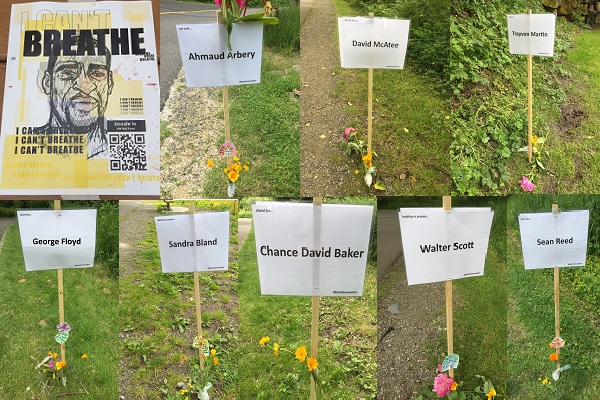Raising Responsible Anti-racist Kids
by Kathy Slattengren, M. Ed., Priceless Parenting (sign up for monthly parenting newsletter and receive 20+ printable charts for kids and parents)
(listen to article read by the author)

Deeply rooted racism underlies many tragedies suffered by blacks. How are you responding to these tragic events? How can you raise your kids to be part of the solution instead of part of the problem?
Police brutality against blacks has long plagued the United States. Blacks are routinely ruthlessly murdered by police and armed white supremacists. Often these people get by with murder.
Black families are forever changed with the loss of their loved ones. Their lives are changed while the systems that permit whites to get by with murder remains the same.
Awakening to the Depths of Racism
The murder of George Floyd on May 25, 2020 triggered a landslide of rage against police killing blacks. Floyd was being arrested for allegedly using a counterfeit $20 bill. The police officer handcuffed Floyd and then knelt on his neck. Despite Floyd’s pleas for mercy. Despite Floyd repeatedly saying “I can’t breathe”. He knelt on his neck for almost 9 minutes until Floyd died.
Watching the video of this horrific evil shook many people awake. Awake to the severity of blacks abused by the police and judicial system. Awake to the impact of systemic racism. Awake to the necessity of coming together and demanding change.
How have you responded to Floyd’s death? You are the leader in your family. Leaders set the tone for what is acceptable versus unacceptable behavior. How you respond sends a powerful message to your children about your values.
Deepening Your Understand of Racism
Unfortunately the United States has a long history of mistreating nonwhites. Your knowledge about this painful history is shaped by what you learned in school plus what you’ve learned on your own.
You know some horrific stories behind European settlers driving Native Americans off their lands to reservations. You also learned about the horrendous treating of blacks through slavery. Often left out is how this history of oppression of black people continues. It’s built into institutions in ways that perpetuate injustice against blacks. It includes things like black kids being excessively expelled from school, black people unduly suffering from police brutality and black people being disproportionately put in jail.
Racism also contributes to the cruel way undocumented Latino immigrants are being treated. Arresting and imprisoning people who have built their lives in the United States and have not committed any crimes is immoral. Separating Latino parents and children trying to enter the United States is heartbreaking.
Wrestling with your own
moral values can prepare you to talk to your kids. How do your moral values impact the way you treat others? How do your values guide your actions when you see racist behavior?
Talking to Your Kids About Racism
Talking to your kids about racism can be uncomfortable especially if you are white and realize all the privileges you enjoy simply because of this.
A person’s race affects how they are treated in society. Pretending that someone’s race doesn’t matter or pretending you don’t notice race denies
this reality. You can learn more through web sites and books dedicated to
helping parents teach anti-racism.
You don’t need all the answers. You just need to start the conversation. If you and your kids are white, you will not have negative experiences due to your skin color. However, you can stand up for others who are being mistreated due to racism.
If your kids are not white, they may run into negative experiences due to their skin color by the time they enter school. For this reason, black parents tend to do a better job talking to their kids about racial prejudices than white parents.
Kids notice racial differences by the time they are preschoolers. Jalen has talked about skin color with her son Sam since he was a toddler. Jalen is black and her husband is white. She’s explained to Sam that some kids have the same skin color as their parents but some do not. Sam appreciates that there are different skin colors and that people are the same on the inside.
You can also read stories together which address racial issues. For example,
Ruby Bridges Goes to School: My True Story tells the story of a 6-year-old black girl who was the first to attend an all-white school.
The many challenges Ruby faces are rich for discussion with your kids. Here are some questions you might ask:
- If you were Ruby, how would you have felt going to an all-white school?
- What do you think Ruby was thinking and feeling as she was escorted to school by federal marshals?
For older kids you can discuss current events involving racism. What would they be thinking and feeling if they were being mistreated like that? How can they help? Making signs and joining protests is one way kids are getting involved.
There is plenty of anti-racism work to be done across the world to create justice for all. Learning the history of racism and seeing how it continues today will help your kids become advocates for racial justice. Discussing racism will help them become a source of healing instead of hatred.